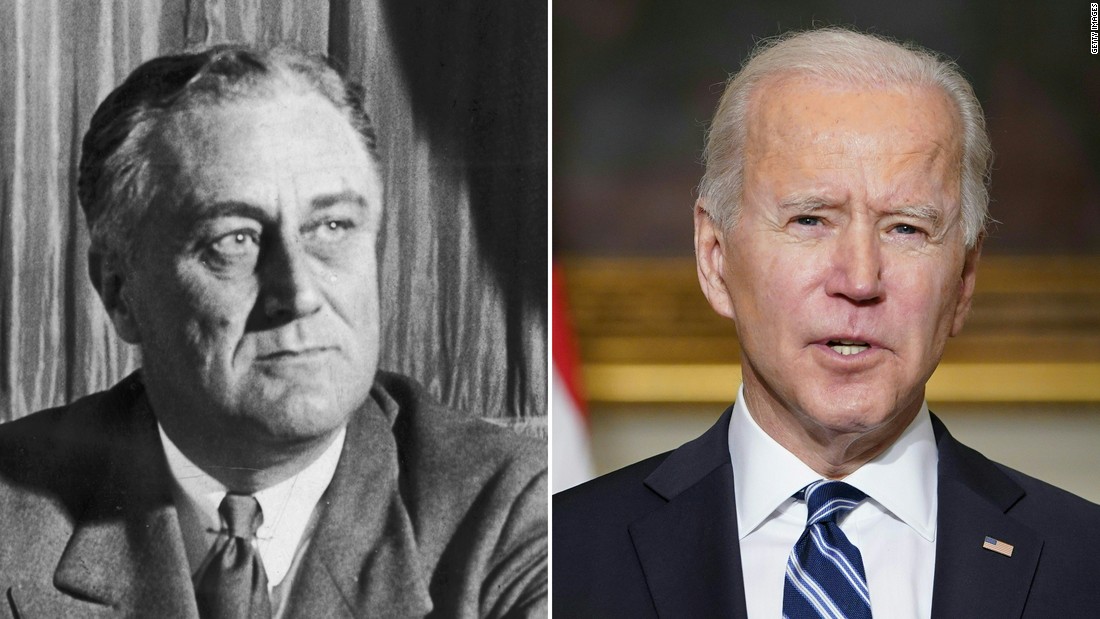
However, Biden's flurry of executive orders forms part of a deliberate strategy to project a new vision for the country, and it makes sense for him to use the power he has in this way. In fact, Biden and his team are modeling their first 100 days in office after the example of one former president in particular: Franklin D. Roosevelt.
Like the Great Depression facing the nation in 1933, when Roosevelt took office, the multiple crises -- health, economic and racial -- afflicting the United States in 2021 require decisive action on both the executive and legislative fronts. To follow successfully in the footsteps of Roosevelt, however, Biden needs to thread the needle between targeted executive action and congressional legislation.
The crisis of the Great Depression compelled Roosevelt to take bold action during his first 100 days in office. In his first inaugural address, he declared: "This nation asks for action, and action now." He hoped to work in coordination with Congress, but if that legislative body failed to act, he would ask for "broad Executive power to wage a war against the emergency as great as the power that would be given to me if we were in fact invaded by a foreign foe."
Biden and his team have hewn closely to this Roosevelt strategy in their first two weeks. In his inaugural address, Biden declared that the many crises facing the United States required "a time for boldness." The administration's call for a "big, bold package" to address Covid-19 relief, viewing the risk as "not going too big, it is going too small." Following the President's lead, Democrats in Congress are prepared to proceed without Republican support if necessary.
During Roosevelt's first 100 days, the Democratically-controlled US House of Representatives and US Senate passed numerous aspects of the proposed New Deal legislation, designed to lessen the economic impact of the Depression on millions of Americans. Among the first of these was the Emergency Banking Act, passed on March 9, just five days after Roosevelt's inauguration, which submitted banks to federal inspection and removed the US from the gold standard. Other legislative efforts, such as National Industrial Recovery Act (NIRA), which aimed to stabilize prices, increase wages and ensure collective bargaining, were hallmarks of this first congressional session.
But Roosevelt also utilized executive orders to augment key components of his New Deal program. Citing the Emergency Banking Act, he ordered private supplies of gold to be given over to increase the government's reserves. Building upon the NIRA, he created the Civil Works Administration -- a jobs program that aimed to add about 4 million government jobs -- and following subsequent emergency relief, he established the Works Progress Administration in 1935 that similarly set forth to create public works jobs. Roosevelt also launched the Rural Electrification Administration that helped bring electricity to rural areas across the country.
In the same way, many of Biden's executive orders address economic concerns that require immediate action. In response to the Covid-19 pandemic, he has called for assistance to those who are struggling to buy food, pay rent and make student loan payments. Similarly, his plan to raise the minimum wage for federal workers to $15 and restore collective bargaining power right echoes Roosevelt's own commitments.
Roosevelt's executive orders during wartime likewise aimed to meet the emergency of effective resource allocation. By executive order, Roosevelt established the War Production Board in 1942 for "assuring the most effective prosecution of war procurement and production." The board stayed in effect until the end of the war in 1945, when it was replaced by the Civilian Production Administration.
The complexities of Covid-19 testing and vaccine distribution demand a similar response from the federal government today. Biden has established a Covid-19 pandemic testing board to widen the capacity of coronavirus testing. He has further directed the Federal Emergency Management Agency (FEMA) to expand federal dollars for expenses pertaining to the National Guard's role in scaling up vaccination.
Nevertheless, executive action can prove terribly misguided. Roosevelt's infamous Executive Order 9066 created military areas for the internment of certain designated Americans, which in practice predominantly targeted Japanese Americans. Despite legal challenges to the order, the US Supreme Court upheld the legality of the camps twice.
Later presidents took executive action to provide restitution to internment victims, until in 1988, Congress passed the Civil Liberties Act to provide reparations totaling $1.6 billion. Fittingly, Biden's recent executive order to address racism, xenophobia, and intolerance against Asian Americans and Pacific Islanders in the US furthers equity among many of these same groups.
Overall, then, executive action worked best for Roosevelt when in tandem with the efforts of Congress. Following Roosevelt's lead, Biden has appropriately begun to utilize the many tools at his disposal, executive orders among them, to combat a pandemic that has already taken more lives than all the American combat casualties in World War II. At the same time, Biden has signaled his intention to work closely with congressional leaders from both parties, even as he has already begun to wind down his use of executive orders to focus on the pending Covid relief bill. But thus far his executive orders have been unaided by congressional legislation.
The critical question remaining is this: will Congress -- as it has done before during times of crisis -- fulfill its responsibility to legislate?
"right" - Google News
February 04, 2021 at 08:21AM
https://ift.tt/3tnW8fd
FDR got this right. Biden can, too - CNN
"right" - Google News
https://ift.tt/32Okh02
Bagikan Berita Ini














0 Response to "FDR got this right. Biden can, too - CNN"
Post a Comment